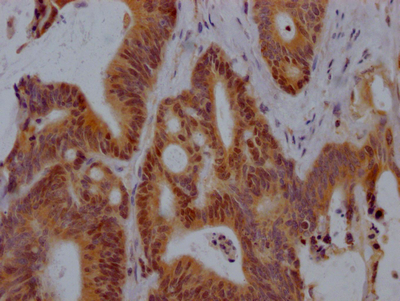PSMA6 Antibody
-
货号:CSB-PA018871GA01HU
-
规格:¥3,900
-
其他:
产品详情
-
Uniprot No.:P60900
-
基因名:PSMA6
-
别名:27 kDa prosomal protein antibody; IOTA antibody; Macropain iota chain antibody; Macropain subunit iota antibody; MGC22756 antibody; MGC2333 antibody; MGC23846 antibody; Multicatalytic endopeptidase complex iota chain antibody; p27K antibody; PROS 27 antibody; PROS-27 antibody; PROS27 antibody; Prosomal P27K protein antibody; Proteasome (prosome macropain) subunit alpha type 6 antibody; Proteasome iota chain antibody; Proteasome subunit alpha type 6 antibody; Proteasome subunit alpha type-6 antibody; Proteasome subunit iota antibody; PSA6_HUMAN antibody; PSMA 6 antibody; PSMA6 antibody
-
宿主:Rabbit
-
反应种属:Human,Mouse,Rat
-
免疫原:Human PSMA6
-
免疫原种属:Homo sapiens (Human)
-
抗体亚型:IgG
-
纯化方式:Antigen Affinity Purified
-
浓度:It differs from different batches. Please contact us to confirm it.
-
保存缓冲液:PBS with 0.1% Sodium Azide, 50% Glycerol, pH 7.3. -20°C, Avoid freeze / thaw cycles.
-
产品提供形式:Liquid
-
应用范围:ELISA,WB,IHC
-
Protocols:
-
储存条件:Upon receipt, store at -20°C or -80°C. Avoid repeated freeze.
-
货期:Basically, we can dispatch the products out in 1-3 working days after receiving your orders. Delivery time maybe differs from different purchasing way or location, please kindly consult your local distributors for specific delivery time.
相关产品
靶点详情
-
功能:Component of the 20S core proteasome complex involved in the proteolytic degradation of most intracellular proteins. This complex plays numerous essential roles within the cell by associating with different regulatory particles. Associated with two 19S regulatory particles, forms the 26S proteasome and thus participates in the ATP-dependent degradation of ubiquitinated proteins. The 26S proteasome plays a key role in the maintenance of protein homeostasis by removing misfolded or damaged proteins that could impair cellular functions, and by removing proteins whose functions are no longer required. Associated with the PA200 or PA28, the 20S proteasome mediates ubiquitin-independent protein degradation. This type of proteolysis is required in several pathways including spermatogenesis (20S-PA200 complex) or generation of a subset of MHC class I-presented antigenic peptides (20S-PA28 complex).
-
基因功能参考文献:
- Results suggest that proteasome subunit alpha type 6 (PSMA6) serves as an attractive target with a high therapeutic index for lung cancer. PMID: 28165654
- The 5' untranslated region of PSMA6 gene contains a single nucleotide polymorphism -8 C/G associated with End-stage kidney disease and might be a protective factor for the disease. PMID: 27671905
- These data indicate that hepatic expression of PSMA6, which is upregulated during viral hepatitis, likely depends on TLR3 activation and, that PSMA6 affects the expression of immunoregulatory ISG15, a proviral factor in the pathogenesis of hepatitis C virus infection. PMID: 26833585
- Data indicate that proteasome subunit alpha 6 (PSMA6) direct contacts with proteasome subunit alpha 7 (PSMA7) tetradecamer. PMID: 26657688
- Evidence of a sex-specific association of PSMA6 genetic variants with subtypes of juvenile idiopathic arthritis. PMID: 24875235
- The data show that LMP2 and PSMA6 gene polymorphism is not a risk factor of ischemic stroke in Ukrainian population. PMID: 24809174
- The PSMA6 variant rs1048990 appears to affect susceptibility to ischaemic stroke in both caucasian and african american populations. PMID: 22882272
- The G allele of PSMA6-8C/G polymorphism is a risk factor associated with increased coronary artery disease susceptibility. [Meat-analysis] PMID: 23111455
- Investigation suggests that -8 C/G variant of PSMA6 gene may be associated with T2DM and diabetes-related metabolic traits in Chinese Dongxiang and Han populations. PMID: 23026512
- PSMA6 polymorphisms were not associated with phenotype of coronary atherosclerosis. PMID: 22310064
- the G-allele of the PSMA6-8C>G polymorphism is a possible survival prognosticator in multiple myeloma PMID: 20408869
- A total of 1330 cases and 2554 controls from Japanese and Korean populations for PSMA6 genotypes were investigated, and no evidence of the association was obtained in both Japanese and Korean populations. PMID: 19282875
- PSMA6 rs_1048990 polymorphism may contribute to MI susceptibility in type 2 diabetes. PMID: 18358479
- common SNP (minor allele frequency of 0.35) in the proteasome subunit alpha type 6 gene (PSMA6) conferring risk of myocardial infarction in the Japanese population PMID: 16845397
- The reported genotype in PSMA6 appears not to contribute appreciably to myocardial infarction, but may contribute slightly to atherosclerosis in the present study population. PMID: 17384448
- 2 SNPs at positions -110 & -8 from translation start, in the promoter region & 5'UTR of PSMA6 were analyzed; genotype -8CG was more frequent in type 2 diabetes patients & haplotype C-110/G-8, compared to C-110/C-8 was associated with higher risk of NIDDM PMID: 17555133
- The GG genotype for rs1048990 was less frequent in the UK population than in the Japanese population, and was associated with an odds ratio for mi of 1.09 per G allele in a co-dominant genetic model and 1.32 in a recessive genetic model. PMID: 18231128
- Our results indicate that the PSMA6 variant rs1048990 is a risk factor of myocardial infarction in the Chinese population. PMID: 19272601
- Obtained data suggest the LMP2 and PSMA6 gene polymorphisms significance as the risk factors of essential hypertension in adolescents. PMID: 19526842
- Haplotypes in KIAA0391 and PSMA6 genes is a genetic link for myocardial infarction and coronary artery disease. PMID: 19624571
显示更多
收起更多
-
亚细胞定位:Cytoplasm. Nucleus.
-
蛋白家族:Peptidase T1A family
-
数据库链接:
HGNC: 9535
OMIM: 602855
KEGG: hsa:5687
STRING: 9606.ENSP00000261479
UniGene: Hs.446260
Most popular with customers
-
-
YWHAB Recombinant Monoclonal Antibody
Applications: ELISA, WB, IF, FC
Species Reactivity: Human, Mouse, Rat
-
Phospho-YAP1 (S127) Recombinant Monoclonal Antibody
Applications: ELISA, WB, IHC
Species Reactivity: Human
-
-
-
-
-




















